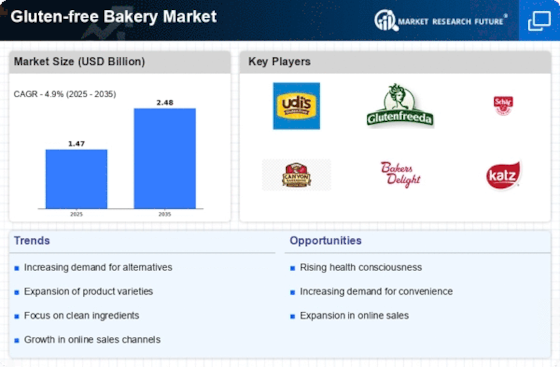Top Industry Leaders in the Gluten Free Bakery Market
Strategies Adopted by Gluten-free Bakery Key Players
The competitive landscape of the gluten-free bakery market is characterized by dynamic shifts in consumer preferences, regulatory considerations, and the pursuit of healthier dietary choices. Key players in this market are engaged in a competitive race to capture a larger share, employing diverse strategies to cater to the growing demand for gluten-free baked goods.
Key Players:
Kraft Heinz Company (US)
Hain Celestial Group Inc (US)
General Mills (US)
Kellogg's Company (US)
ConAgra Brands Inc (US)
Hero AG (Switzerland)
Barilla G.E.R Fratelli S.P.A (Italy)
Quinoa Corporation (US)
Raisio PLC (Finland)
Dr Schär AG/SPA (Italy)
Enjoy Life Foods (US)
Farmo S.P.A. (Italy)
Freedom Foods Group Limited (Australia)
Koninklijke Wessanen N.V (Netherlands)
Big OZ (UK)
Alara Wholefoods Ltd (UK)
In the gluten-free bakery sector, strategies adopted by key players revolve around product innovation, marketing initiatives, and strategic partnerships. Given the increased awareness of gluten-related sensitivities and the desire for healthier alternatives, companies are investing heavily in research and development to formulate gluten-free products that replicate the taste and texture of traditional baked goods. General Mills, for example, has focused on expanding its gluten-free product portfolio through continuous innovation, addressing a broader consumer base.
Marketing strategies play a crucial role, with companies emphasizing the health benefits of gluten-free options and targeting specific consumer segments, such as those with celiac disease or gluten sensitivity. The Hain Celestial Group, known for its emphasis on organic and natural products, has leveraged its brand image to position its gluten-free offerings as premium and health-conscious choices.
Strategic partnerships are also prevalent in the industry, facilitating market expansion and product diversification. Dr. Schär, a European player, has engaged in partnerships with retailers and distributors to broaden its reach and ensure accessibility of its gluten-free products to a wider audience.
Market Share Analysis:
Market share analysis in the gluten-free bakery market is influenced by several key factors. Quality and taste remain paramount, as consumers are increasingly discerning when it comes to gluten-free alternatives. Companies that successfully achieve a balance between health considerations and taste preferences tend to secure a larger market share.
Brand reputation and recognition also play a significant role in market share dynamics. Established players benefit from consumer trust built over years, while emerging companies need to invest in building brand credibility to compete effectively. Pricing strategies, distribution efficiency, and responsiveness to consumer feedback are additional factors that impact market share within this niche but rapidly growing market.
New and Emerging Companies:
The gluten-free bakery market has witnessed the emergence of new and niche players focusing on innovative approaches to meet the evolving needs of consumers. Startups like Simple Mills and Udi's Gluten Free have gained traction by offering gluten-free baked goods with clean label ingredients. These companies often capitalize on consumer demand for transparency in product sourcing and production processes.
Industry News and Current Company Investment Trends:
In recent years, the gluten-free bakery market has seen notable trends and investment patterns. One significant trend is the incorporation of alternative flours and ingredients in gluten-free products. Companies are exploring diverse options such as almond flour, coconut flour, and rice flour to enhance the nutritional profile and taste of their gluten-free offerings.
Additionally, the industry is witnessing increased investment in digital marketing and e-commerce channels. As consumers seek convenient and accessible ways to purchase gluten-free products, companies are optimizing their online presence and collaborating with e-commerce platforms to reach a wider audience. This shift is evident in the efforts of Enjoy Life Foods, which has invested in enhancing its online retail capabilities to cater to the evolving purchasing habits of consumers.

Competitive Scenario:
The gluten-free bakery market's competitive scenario reflects a balance between established players maintaining their dominance and new entrants disrupting traditional norms. The industry's growth is fueled by the increasing prevalence of gluten-related health concerns and a broader health and wellness trend among consumers. Adapting to regulatory changes, understanding consumer preferences, and delivering high-quality gluten-free products are key factors for sustained success in this competitive market.
Recent Developments:
Bunge Loders Croklaan: Developed new starches and flours free of gluten from ancient grains and legumes that provide better nutritional profiles and baking performance.
Ingredion: Introduced a line of functional protein blends that improve texture and shelf life and are especially made for use in gluten-free bread applications.
Ajinomoto Bakery Company: Introduced yeast-based fermentation technique, leading to a more tender crumb and enhanced flavour in gluten-free bread.











